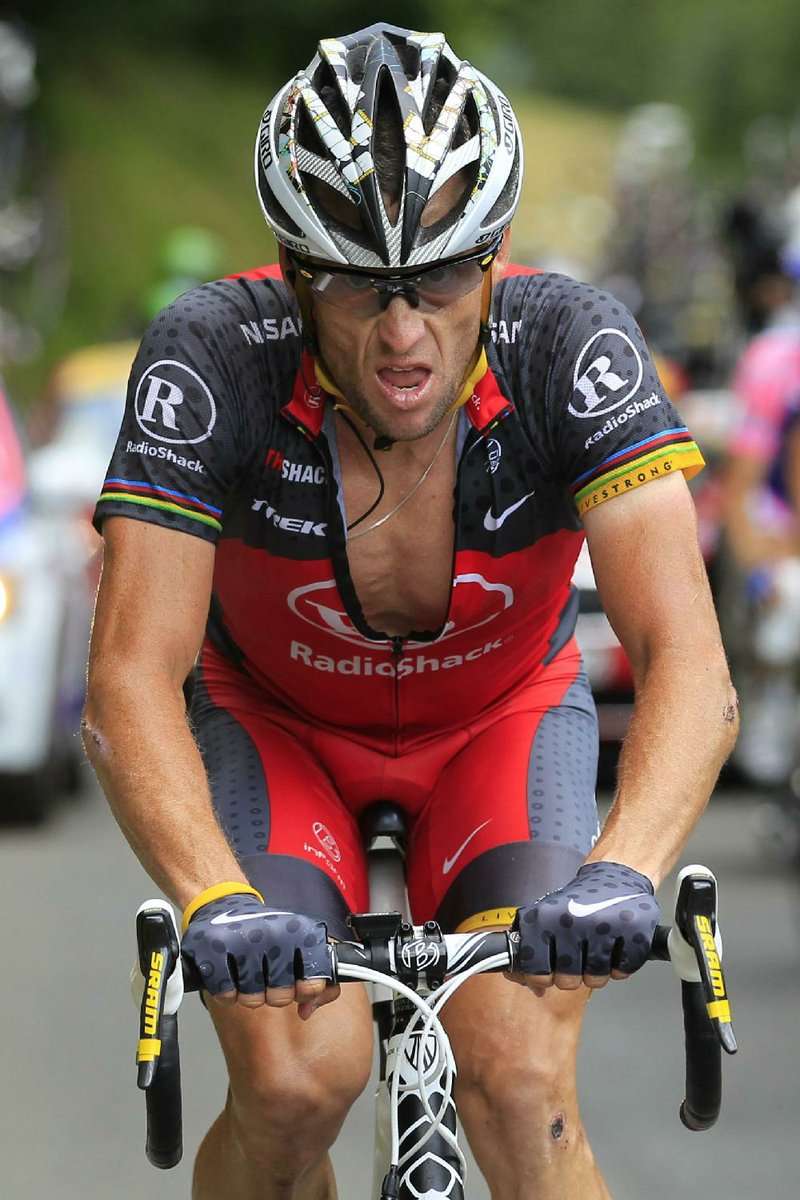PORTO VECCHIO, Corsica - Lance Armstrong made himself the uninvited guest at the Tour de France on Friday, coming back to haunt the 100th edition of the race and infuriating riders past and present by talking at length in a newspaper interview about doping in the sport.
Armstrong told Le Monde that he still considers himself the record-holder for Tour victories, even though all seven of his titles from 1999-2005 were stripped from him last year for doping.
He said his life has been ruined by the U.S. Anti-Doping Agency investigation that exposed as lies his years of denials that he and his teammates doped. He also took another swipe at cycling’s top administrators, suggesting they could be brought down by other skeletons in the sport’s closet.
None of those comments broke new ground, but in answering questions from Le Monde - a newspaper he scorned when he was competing - Armstrong ensuredhis views on doping at the Tour would have maximum impact in France and couldn’t easily be written off as sour grapes being hurled at the race from afar.
The daily is very much France’s newspaper of record. Its interview with the rider and his assertion that doping won’t be eradicated from cycling dominated French airwaves ahead of the race’s start today, causing dismay and anger in the sport desperate to prove that it has turned the page on his era of serial cheating.
The Tour’s director, Christian Prudhomme, suggested Armstrong was milking the race’s notoriety to further his own agenda.
“This is a very big tournament, just look around,” he said. “There are 2,300 accredited journalists here, there are cameras everywhere. So if someone wanted to transmit a message, this is the time obviously, especially since everyone likes this kind of controversial statements.”
Armstrong’s comments and the consternation they caused highlighted cycling’s dilemma: It is a sport fighting to give itself a cleaner, brighter future by combating drug cheats, but much of that goodwork is being overshadowed by the dirty secrets of dopers from the past.
Doping confessions and revelations about the Armstrong era have rained on the sport. Armstrong’s former rival, 1997 Tour winner Jan Ullrich, admitted to blood-doping for the first time. French media also reported that a Senate investigation into the effectiveness of anti-doping controls pieced together evidence of drug use at the 1998 Tour by Laurent Jalabert, a former star of the race who is now a broadcaster.
Armstrong’s claim that it was “impossible” to win the Tour without doping in his era echoed what he already told U.S. television talk show host Oprah Winfrey in January, when he finally confessed.Then, he said doping was “part of the job.” The banned hormone erythropoietin, or EPO, wasn’t detectable by cycling’s doping controls until 2001 and was widely abused because it prompts the body to produce oxygen-carrying red blood cells, giving a big performance boost to endurance athletes.
“The Tour is a test of endurance where oxygen is decisive,” Le Monde quoted Armstrong as saying.
Asked later by The Associated Press to clarify his comments, Armstrong confirmed on Twitter he was talking solely about the period from 1999-2005. He indicated that doping might not be necessary now.
“Today? I have no idea. I’m hopeful it’s possible,” Armstrong tweeted.
Still, his comments touched a nerve because cycling has since spent heavily on a pioneering anti-doping program and because Armstrong, once very much a boss of the peloton, is now a pariah.
“Those were cursed years for the Tour de France,” Prudhomme said. “When Armstrong said it was impossible to win the Tour during those years without doping, he is probably trying to find excuses for himself and say implicitly that there was nothing else he could have done.”
Jean-Rene Bernaudeau, manager of the Europcar team, likened Armstrong to a robber who tells a bank how it should be run.
“I don’t think it is nice that a guy who embodies a decade we should completely forget gives us lessons on how we should behave, while we were the ones who suffered during that time. It is almost surreal,” he said. “This is unacceptable.”
In a statement issued in the name of competitors at the 100th Tour, a union representing European professional riders said enough is enough.
“It is disgraceful to be systematically dragged through the mud and be denigrated by people aiming to make money off our backs or seeking notoriety,” said the French wing of the union, the CPA.
Sports, Pages 19 on 06/29/2013

